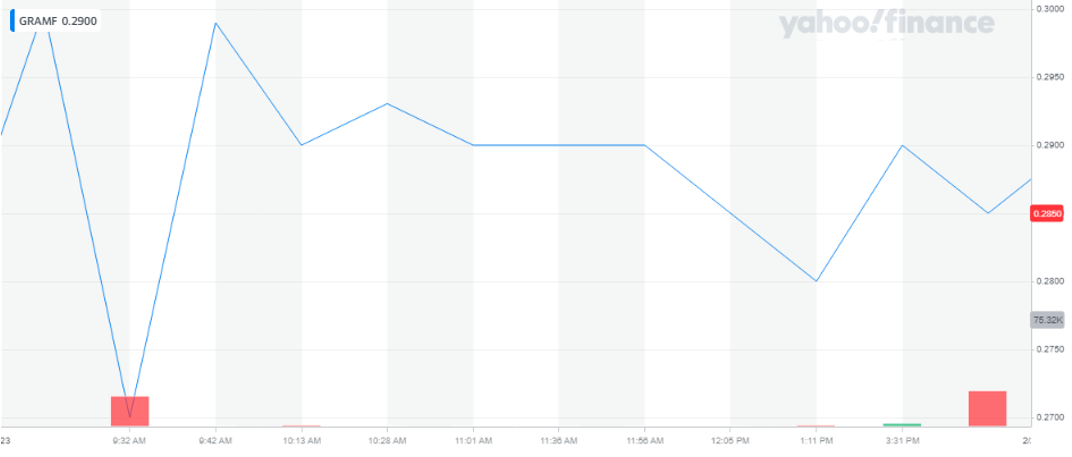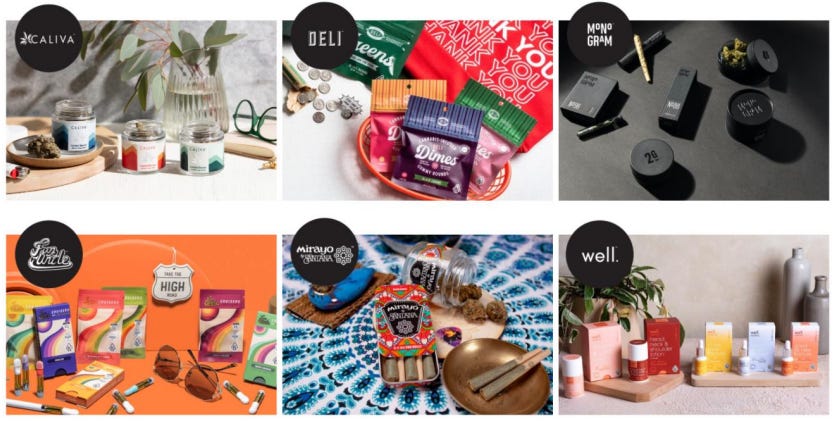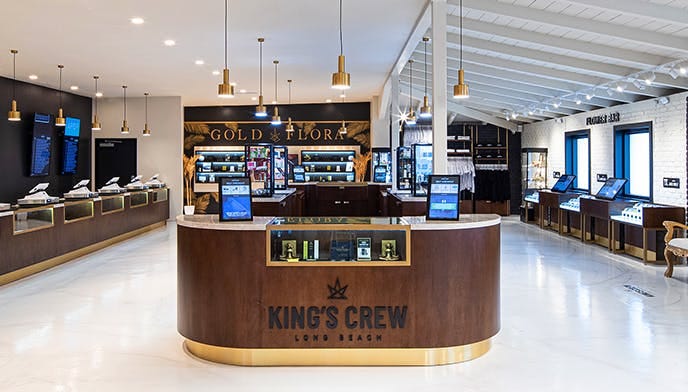🤝 The Parent Company (TPCO) and Gold Flora to Merge
TPCO merges with Glora Flora rather than go at it alone. A standalone TPCO with its cash balance was thought to have a huge competitive advantage in the cash-strapped California Cannabis Market.
TPCO Holding Corp. 10-K (March 30, 2022)
TPCO Holding Corp. 10-Q (November 14, 2022)
Transaction Summary. The Parent Company shareholders will own ~49%, and Gold Flora holders will own ~51%, of the outstanding common equity of the combined company on a pro forma basis upon consummation of the Business Combination. The combined company is expected to operate a footprint of 20 retail stores, 12 house brands, 3 distribution centers, and 1 manufacturing facility and 6 cultivation facilities. The combined company will have an indoor cultivation canopy of approximately 72,000 sq ft (Gold Flora and TPCO both operated ~35,000 sq ft indoor cultivations), with the opportunity to expand to a further approximately 240,000 sq ft. Through the streamlining of retail operations, utilizing scale to access bulk purchasing power, and eliminating third-party contracts, the combined company is expected to achieve annualized cost savings of between $20–$25M. The combined company will reduce third-party contracts when strategically and cost effectively appropriate by utilizing the capabilities of Gold Flora and controlling its value chain. The combined company would have pro forma revenue of $116.4M (TPCO contributing $63.7M) for the nine-month period ended September 30, 2022, with a gross margin of 33% (TPCO was at 30.4%, $19.4M Gross Profit / $63.7M Sales).
Thoughts:
Back to Vertically-integrated. TPCO divested SISU and opted to partner with Nabis for distribution, opting instead to focus on its retail and brands. However, with this merger with Gold Flora, the company is once again choosing to become vertically-integrated. In Q3 2022, the company’s Gross Margin sat at 33.8% ($6.7M Gross Profit /$19.6M Revenue, Net of Discounts), while the Combined Company is expected to be ~33% Gross Margin (which means Gold Flora’s Gross Margin was only slightly higher). In the press release, the company points out that they can save $20–25M annually by utilizing scale to access bulk purchasing power (what TPCO seemed to have with SISU), and eliminating third-party contracts (co-man and distribution?). The company will continue to push the brand portfolio across the retail channel (expected to be at 20 dispensaries at the end of 2023). As noted previously and again on the conference call, Coastal Group sold only 2% of TPCO brand at acquisition and is now up to 20%.
Alternatives. TPCO was intent on conserving its cash position to close out 2022 at ~$100M, myself and others in the industry viewed this as a huge competitive advantage, given the cash strapped competition in California. It is surprising the company chose to do a deal now, rather than use that cash to continue building out its retail and brands on a stand-alone basis. Another question is whether or not the Company explored all potential partners, i.e., partners with a stronger top 5 position in retail or brands. In an interview with New Cannabis Ventures in March 2022, CEO Laurie Holcomb, said that Gold Flora was targeting $150M in revenue and $40M in EBITDA this year, if the company did actually come near these targets, it may have made sense why the TPCO Board opted to merge with Gold Flora.
Brands. The combined entity will be well-positioned as a top 10 brand portfolio by revenue. In order for this combination to make sense, I believe the combined company will have to quickly become a top 3 brand portfolio to have the deal make sense, especially given the ~$100M cash that TPCO is assumed to have.
Mind Share of non Tier 1 or Tier 2 MSO.
When the transaction was announced on February 22, 2023, few were talking about the deal as the stock is lightly covered (two Analysts, one of which showed up on the conference call). Only two large block trades occurred the day of the announcement, ~63,950 shares sold (~$17,000) after market opened and ~75,320 shares sold (~$21,500) before market closed. This further emphasizes the need to enter the Tier 1 or Tier 2 buckets to increase trading volume and have the stock price move on news. Oftentimes, the Tier 3 or below publicly-traded Cannabis companies does not trade on earnings or news.
Deal Approval. The Business Combination is expected to close before the end of the third quarter of 2023, following the satisfaction or waiver of closing conditions including, among others, approval by two-thirds of the votes cast by the shareholders of The Parent Company at the Meeting, the approval of the Supreme Court of British Columbia, and the approval of the NEO Exchange. Major shareholders that will have a vote on the transaction (but are also a part of the Board that seems to be in favor of a deal) include Daniel Neukomm/La Jolla Group (9,469,699 shares), Michael Auerbach/Subversive Capital (6,654,334 shares), Al Floreman/Tuatara Holdings (4,073,321 shares), Leland Hensch/Subversive Capital (1,122,787 shares). The entire board of directors holds ~34,000,000 (as of 10-K) common shares of the Company and those shares were originally locked up locked-up until January 28, 2022 before being renewed for a further 12-months until January 28, 2022. As of March 30, 2022, there were 99,185,332 common shares outstanding.
📰 THE PARENT COMPANY
Dispensaries.
Following the de-SPAC transaction, TPCO acquired Coastal (Santa Barbara, Pasadena, West Los Angeles, Stockton and Vallejo, another retail license location in Northern California and operating delivery depots in Santa Barbara and San Luis Obispo) and Calma (West Hollywood). The company also divested several locations (five in total) and away from bulk sales (SISU) towards retail.
This shift resulted in a decline in sales, while retail increased for two quarters before leveling out in Q2 2022.
Brands.
TPCO brands at time of the Qualifying Transaction included Caliva, DELI, Monogram (through partnership with Roc Nation), Fun Uncle, Mirayo by Santana. The Company’s latest brand is Well by Caliva (introduced August 2021), which is a line of wellness products (lotions and tinctures).
Balance Sheet.
As of September 30, 2022, the Company had $107.1M in cash and just $0.9M in debt. It’s important to note the $25.3M in Accounts Payable (against $2.1M in AR) and the $25.5M deferred tax liability. However, even taking into account reduction of AP and cash held for the deferred tax liability, TPCO is still in an advantageous position with regards to cash.
SPAC and M&A.
On November 24, 2020, the Company announced that it had entered into definitive transaction agreements to acquire all of the equity of Caliva and Left Coast Ventures (LCV). The acquisition of Caliva and LCV constituted the Company’s qualifying transaction, which was completed on January 15, 2021. In connection with the closing of the Qualifying Transaction, the Company amended its Articles to change its name to “TPCO Holding Corp.”
On May 17, 2021, the Company obtained the rights to four acres of land that is licensed for outdoor grow from a consortium of experienced cannabis farms affiliated with Mosaic.Ag. In addition, the Company entered into a cultivation and supply agreement with a cultivator to cultivate cannabis on its behalf for a period of at least three years, with options to extend up to five years. The purchase price for Mosaic.Ag was $6.0M cash, $2.5M stock, and up to 1.3M stock in an earnout.
On August 2, 2021, the Company acquired Kase’s Journey, an operating retail dispensary located in Ceres, CA, for $1.3M cash and $1.2M of consideration payable.
On August 16, 2021, the Company acquired Martian Delivery, an operating retail dispensary located in Sacramento, CA for $237,500 cash and $237,500 in notes payable.
On October 1, 2021, the Company entered into definitive agreements to acquire Coastal for up to $56.2M ($16.2M cash, $20M stock, and $20M stock contingent upon the successful transfer of Coastal’s cannabis licenses). The Company also inherited a minority stake in a southern California dispensary and an option to purchase the remainder of that dispensary for $9M in cash ($4.5M of the exercise price of the Coastal Option was prepaid upon execution of the Coastal Agreements).
On October 1, 2021, the Company acquired Calma, an operating dispensary located in West Hollywood, CA, for $11.5M ($8.5M cash, $3M stock).
🌼 GOLD FLORA
Dispensaries.
King’s Crew. Long Beach-based dispensary opened on May 25, 2019. King's Crew is the flagship dispensary for Gold Flora and is located just south of CSULB.
Airfield Supply Co. San Jose-based Airfield has on-site indoor cultivation facilities that include a 9,000-square-foot canopy and manufactures co-branded products within its 20,000-square-foot location near the San Jose International Airport. The company also has one of only two delivery licenses in Mountain View, CA. Acquired February 2022. The company also has the rights to open a second store in San Jose.
Higher Level Dispensaries (Seaside, Hollister, Greenfield). Acquired Higher Level dispensaries in Seaside and Hollister. Option to purchase an additional Higher Level dispensary located in Greenfield. Acquired September 2021.
Organic Applications. Gold Flora was awarded a retail license in Costa Mesa and Corona. The company also has an option in Redwood City.
Brands.
Jetfuel. Strains at launch include Durban Poison, Animal Mints, Bubba Kush, Tropicanna Cookies, Triangle OG, and Alien Cookies. Continuous rotating strain drops will offer a variety of selections for all consumer preferences. The Jetfuel cartridge line is available today at Gold Flora's family of dispensaries, including King's Crew in Long Beach, Airfield Supply Company in San Jose, Higher Level in Seaside, and Higher Level in Hollister.
Gold Flora.
Flower: small-batch flower
Vape pens:
Gold Rush: Refined Distillate Oil Strain Specific: Cannabis Derived AND Natural Botanical Terpenes Bright, Flavorful Taste & High in Potency (85-95% THC) Available in Various Rotating Strains
Black Gold: Full-Spectrum, Cured Resin Oil Strain Specific: Cannabis Derived Terpenes Bold Cannabis Taste & High in Potency (85-95% THC) Available in Various Rotating Signature Strains
White Gold: Full-Spectrum, Cured Resin CBD Oil Cannabis Derived AND Natural Botanical Terpenes CBD-Rich with Mild Psychoactive Effects (20-23% THC) Available in Various Rotating CBD Formulations
naked af. Disposable vape pens extracted via natural CO2 methods. Features bold, full-spectrum oil which is high in potency and full in cannabis flavor.
Others. Roll Bleezy, Sword & Stoned and Aviation Cannabis.
Cultivation.
Gold Flora has a 620,000 sq ft (Phase One, completed in March 2020, was 200,000 sq ft) cannabis campus located in Desert Hot Springs, CA, where it houses the company's indoor cultivation, manufacturing, and extraction efforts, as well as its own distribution. With hubs throughout the state, the company sells and distributes for a dozen other prominent brands, including their own premium brand of Gold Flora products. Gold Flora started cultivating in its 35,000 sq ft Desert Hot Springs, CA grow in March 2020 and had 62,000 sq ft of Canopy as of March 2022.
In May 2021, the company’s Lion’s Cake strain was developed exclusively for Gold Flora by Jack Whipple, CEO of Whipple Effect Consulting and Pyschonaut Genetics. Xabis (Denver, CO) operates its extraction and manufacturing.
Distribution.
Through its Shelf Life (RYL Distribution) distribution network, Gold Flora currently distributes in excess of 15 brands to over 425 licensed dispensaries within the State of California (January 2021). The company has distribution hubs in San Jose, Modesto, Seaside, Desert Hot Springs and Costa Mesa.
Funding and Sale-Leaseback.
As part of a strategic partnership, Stately Brands injected C$10M and contribution of other assets to Gold Flora. In a interview with New Cannabis Ventures, CEO, Laurie Holcomb said Gold Flora’s first $10M round came from friends and family, many of whom she knew from her days in the real estate business. Since then, the company’s investor pool of high-net-worth individuals has grown to also include a couple of institutional groups. One of the company’s institutional investors provided it with a $45M M&A line, of which, the Company has not drawn down even half of that line.
In October 2021, Gold Flora closed on the acquisition of a 201,000 sq. ft. industrial property in Desert Hot Springs, California, and entered into a long-term lease with IIPR. The purchase price for the property was $51.0M (excluding transaction costs). Gold Flora was expected to complete additional tenant improvements for the property as a regulated cannabis cultivation and processing facility, for which IIP has agreed to provide reimbursement of up to $9.0M (Gold FLora is IIPR’s 13th largest tenant based on invested capital).
👋 Highly Objective is curated by Dai Truong, who leads Cannabis Investment Banking at Arlington Capital Advisors. Third-party information presented here and links to third-party content are for informational purposes only and are not intended as a recommendation, offer or solicitation for the purchase or sale of any financial instrument, security or investment. The information provided is not warranted as to completeness or accuracy and is subject to change without notice. Linking to third-party sites in no way implies an endorsement or affiliation of any kind between Arlington Capital Advisors, LLC, or its affiliates and any third party. The information in this blog constitutes my own opinions (and any opinions posted by guest bloggers from time to time) and it should not be regarded as a description of services provided by Arlington Capital Advisors, LLC or any affiliate.














